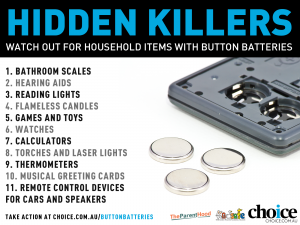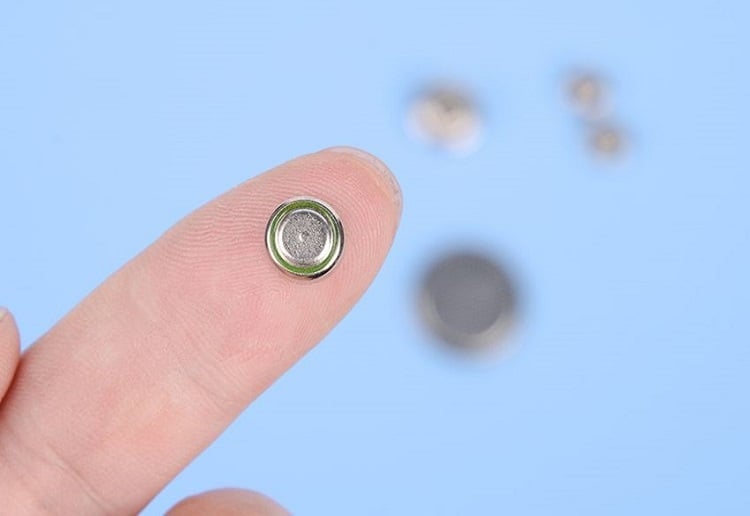RENEWED concern over safety standards for all products containing button batteries.
An estimated 20 children are hospitalised per week after ingesting button batteries. That’s twenty too many!
Currently, only toys designed for children under three years of age are required by law to have secure battery compartments.
“Button batteries are powerful, slim and light but they can also be lethal. It vital that the Federal Government acts to reduce the number of children ending up in emergency departments across the country having swallowed a button battery,” says CHOICE Head of Media Tom Godfrey.
“At the moment only toys designed for children under three years of age are required by law to have secure battery compartments, which means that other everyday household items have no mandatory safety standards.
“A quick scan of your home will find poorly secured button batteries in everything from bathroom scales and calculators to remote controls, musical greeting cards, games and toys,” Mr Godfrey says.
“Also known as disc or coin batteries, button batteries can cause chemical burns when stuck in body tissue and can be fatal. This can occur even when a consumer believes the battery to be flat.
“One of the problems with these batteries is that they can be swallowed easily without getting stuck or causing the child to cough, so unless someone sees it happen, parents or carers will be none the wiser.
“The symptoms are also varied, ranging from feeling slightly ill to having a mild cough. To make matters worse, children are often reluctant to tell anyone if they’ve swallowed something they weren’t supposed to.
Twenty children are rushed to hospitals each week after swallowing button batteries. @freya_cole #7News pic.twitter.com/PzlkEmWNNj
— 7 News Sydney (@7NewsSydney) May 14, 2017
“With button batteries being used in a growing number of products, it’s time to make products with button batteries child resistant,” Mr Godfrey says.
‘An electrical current is immediately triggered by saliva, which causes a chemical reaction that can cause severe burns to the child’s oesophagus and internal organs such as the lungs, heart, arteries and spine,’ the Product Safety Australia website said.

In the video below, CHOICE conducted a test to simulate the devastating consequences of a child accidentally ingesting a button battery.
Last month we shared a two-year-old girl from the UK was left fighting for her life after she accidentally swallowed a lithium “button” battery. Read her story HERE.
Safety tips
• If you suspect a child has swallowed a button battery, immediately call the Poisons Information Centre on 13 11 26 or go to a hospital emergency room. Do not let the child eat or drink, and do not induce vomiting.
• Keep all disc battery operated devices out of sight and out of reach of children.
• Examine devices and make sure the battery compartment is secure.
• Dispose of used button batteries immediately. Flat batteries can still be dangerous.
• Tell others about the risk associated with button batteries, and how to keep their children safe.
https://www.youtube.com/watch?v=iuWnIplKGcQ
Share your comments below.





















-

-
-
BellaB said
- 25 Oct 2020
-

-
-
mom94125 said
- 08 Oct 2017
-

-
-
mom247592 said
- 19 Aug 2017
-

-
-
mom101628 said
- 20 May 2017
-

-
-
mom112217 said
- 16 May 2017
-

-
-
mom93821 said
- 16 May 2017
-

-
-
Ellen said
- 16 May 2017

-

-
-
BellaB said
- 31 May 2016
-

-
-
june11 said
- 31 May 2016
-

-
-
mom160421 said
- 31 May 2016
-

-
-
mom90758 said
- 31 May 2016
-

-
-
mum4107 said
- 31 May 2016
-

-
-
mom81879 said
- 31 May 2016
Post a comment7:26 pm
8:03 pm
9:25 am
9:31 pm
9:02 am
7:23 am
6:38 am
4:52 pm
2:38 pm
1:15 pm
12:46 pm
12:37 pm
12:35 pm
To post a review/comment please join us or login so we can allocate your points.